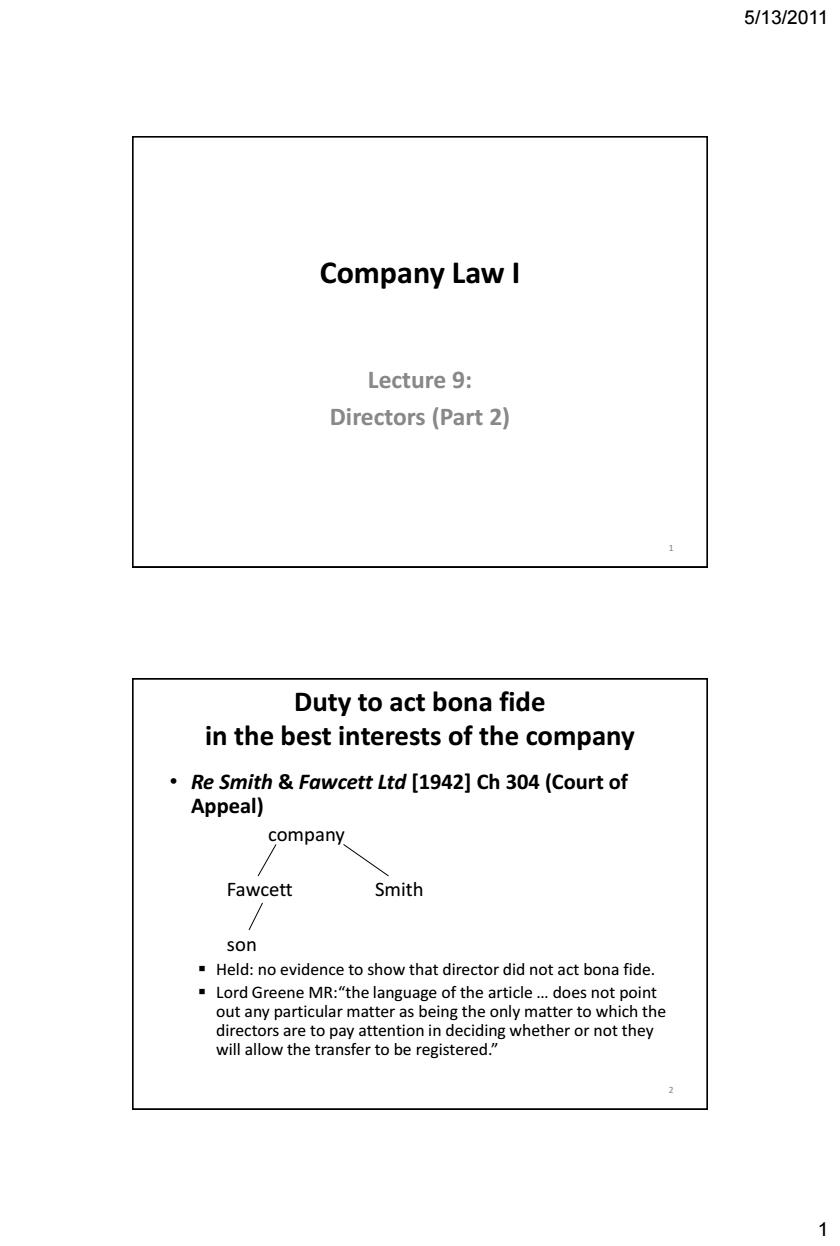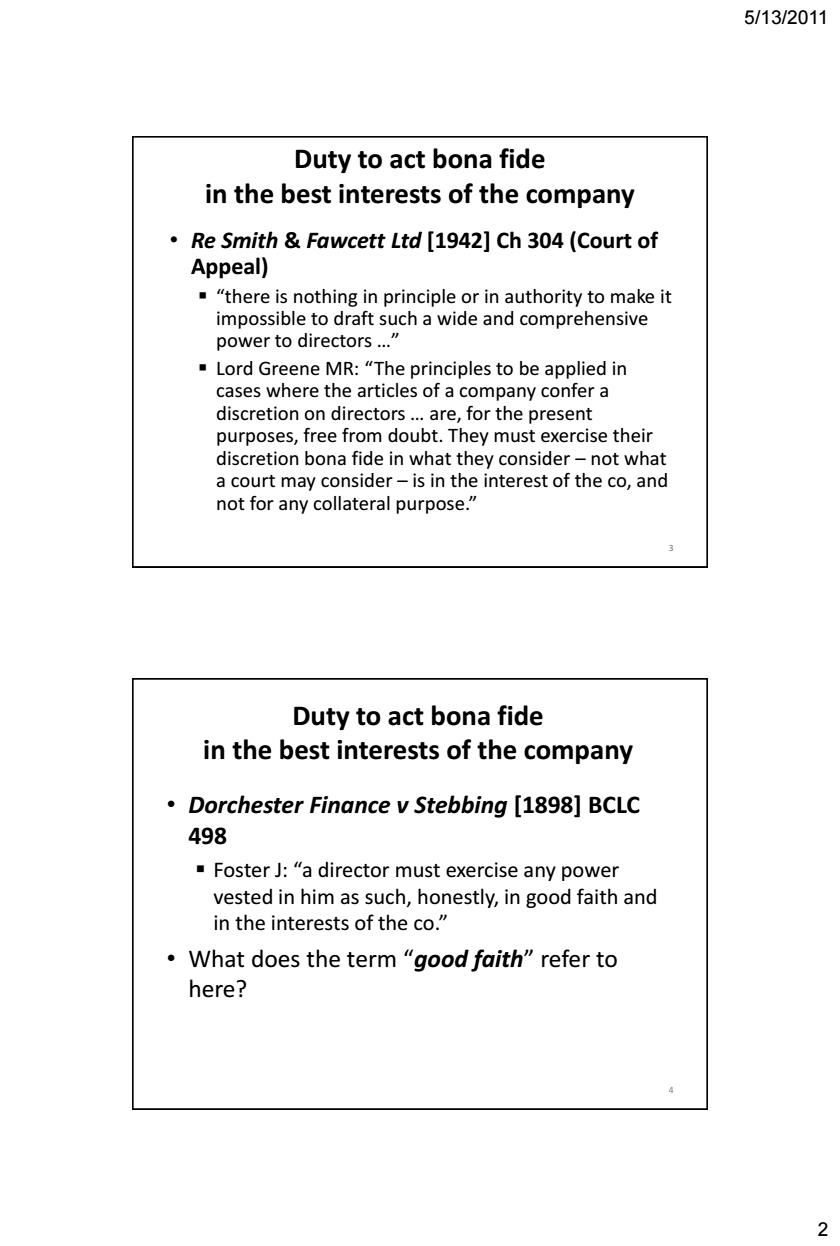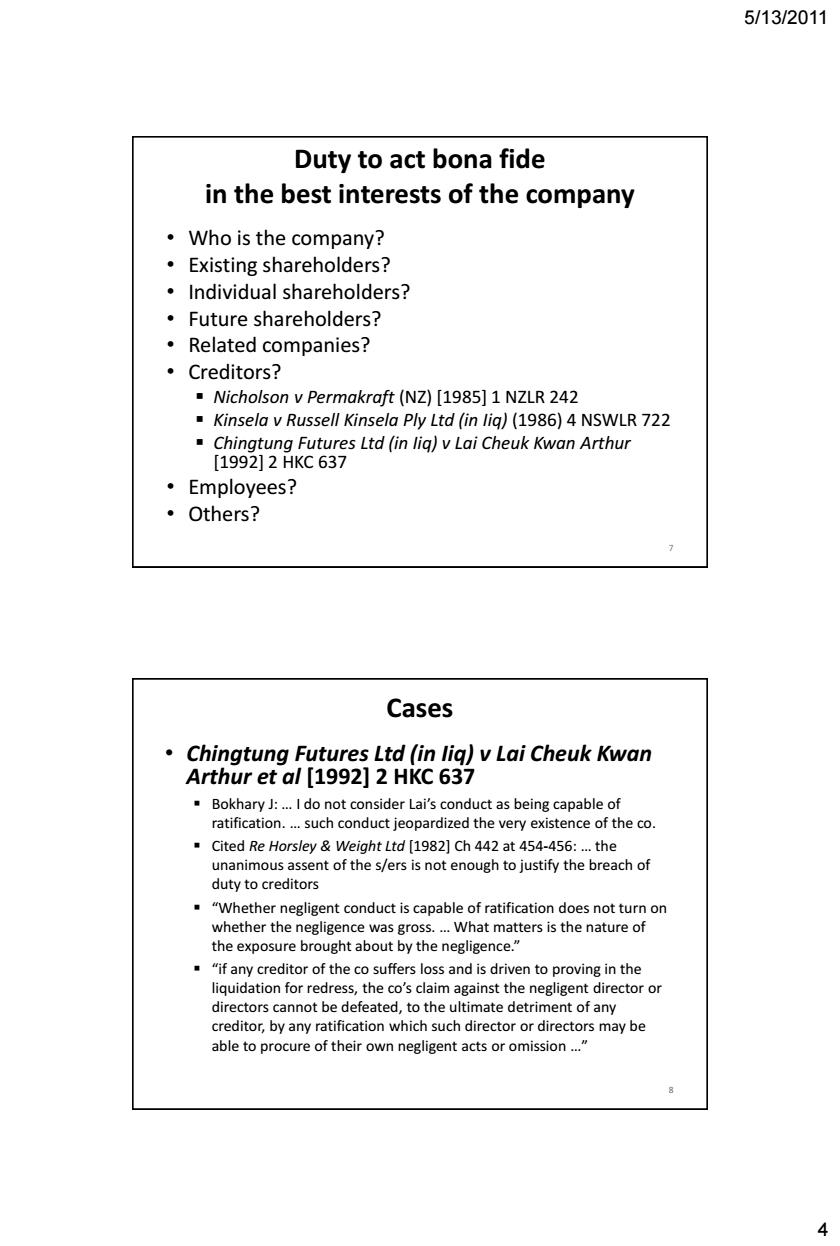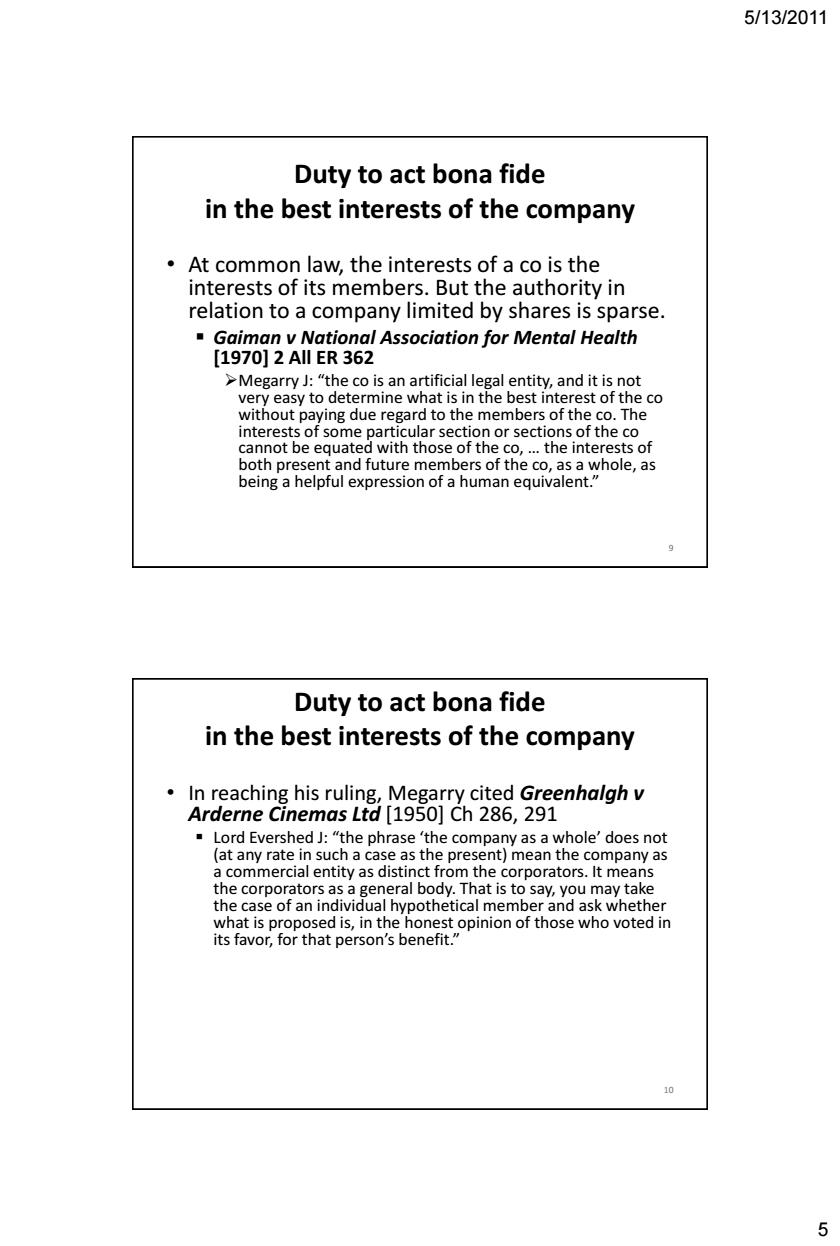
5/13/2011 Company Law I Lecture 9: Directors (Part 2) Duty to act bona fide in the best interests of the company Re Smith Fawcett Ltd [1942]Ch 304 (Court of Appeal) company Fawcett Smith son Held:no evidence to show that director did not act bona fide. Lord Greene MR:"the language of the article...does not point out any particular matter as being the only matter to which the directors are to pay attention in deciding whether or not they will allow the transfer to be registered." 1
5/13/2011 1 1 Company Law I Lecture 9: Directors (Part 2) 2 Duty to act bona fide in the best interests of the company • Re Smith & Fawcett Ltd [1942] Ch 304 (Court of Appeal) company Fawcett Smith son Held: no evidence to show that director did not act bona fide. Lord Greene MR:“the language of the article … does not point out any particular matter as being the only matter to which the directors are to pay attention in deciding whether or not they will allow the transfer to be registered

5/13/2011 Duty to act bona fide in the best interests of the company Re Smith Fawcett Ltd [1942]Ch 304 (Court of Appeal) "there is nothing in principle or in authority to make it impossible to draft such a wide and comprehensive power to directors..." Lord Greene MR:"The principles to be applied in cases where the articles of a company confer a discretion on directors...are,for the present purposes,free from doubt.They must exercise their discretion bona fide in what they consider-not what a court may consider-is in the interest of the co,and not for any collateral purpose." Duty to act bona fide in the best interests of the company Dorchester Finance v Stebbing [1898]BCLC 498 Foster J:"a director must exercise any power vested in him as such,honestly,in good faith and in the interests of the co." What does the term"good faith"refer to here? 2
5/13/2011 2 3 Duty to act bona fide in the best interests of the company • Re Smith & Fawcett Ltd [1942] Ch 304 (Court of Appeal) “there is nothing in principle or in authority to make it impossible to draft such a wide and comprehensive power to directors …” Lord Greene MR: “The principles to be applied in cases where the articles of a company confer a discretion on directors … are, for the present purposes, free from doubt. They must exercise their discretion bona fide in what they consider – not what a court may consider – is in the interest of the co, and not for any collateral purpose.” 4 • Dorchester Finance v Stebbing [1898] BCLC 498 Foster J: “a director must exercise any power vested in him as such, honestly, in good faith and in the interests of the co.” • What does the term “good faith” refer to here? Duty to act bona fide in the best interests of the company

5/13/2011 Duty to act bona fide in the best interests of the company Another example:Bishopsgate Investment Management Ltd (in lig)v Maxwell (No 2)[1994]1 All ER 261 Acting contrary to the corporate constitution could also be regarded as being in breach of the duty to act in the interests of the co as the constitution can define and set limits to the co's interest. Duty to act bona fide in the best interests of the company Business judgment rule Delaware courts will apply rationality review to business judgments provided that the directors have complied with their duty of care and their duty of loyalty. English courts do not review business judgments. >Howard Smith v Ampol Petroleum Ltd. >But in Re Walt Disney Derivative Litigation 907 A 2d 693 (Del Ch 2005) 3
5/13/2011 3 5 • Another example: Bishopsgate Investment Management Ltd (in Iiq) v Maxwell (No 2) [1994] 1 All ER 261 Acting contrary to the corporate constitution could also be regarded as being in breach of the duty to act in the interests of the co as the constitution can define and set limits to the co’s interest. Duty to act bona fide in the best interests of the company 6 • Business judgment rule Delaware courts will apply rationality review to business judgments provided that the directors have complied with their duty of care and their duty of loyalty. English courts do not review business judgments. Howard Smith v Ampol Petroleum Ltd. But in Re Walt Disney Derivative Litigation 907 A 2d 693 (Del Ch 2005) Duty to act bona fide in the best interests of the company

5/13/2011 Duty to act bona fide in the best interests of the company ·Who is the company? Existing shareholders? Individual shareholders? Future shareholders? ·Related companies? ·Creditors? Nicholson v Permakraft (NZ)[1985]1 NZLR 242 Kinsela v Russell Kinsela Ply Ltd (in liq)(1986)4 NSWLR 722 Chingtung Futures Ltd(in liq)v Lai Cheuk Kwan Arthur [1992]2HKC637 ·Employees? Others? Cases Chingtung Futures Ltd(in lig)v Lai Cheuk Kwan Arthur et al [1992]2 HKC 637 Bokhary J:...I do not consider Lai's conduct as being capable of ratification....such conduct jeopardized the very existence of the co. Cited Re Horsley Weight Ltd [1982]Ch 442 at 454-456:...the unanimous assent of the s/ers is not enough to justify the breach of duty to creditors "Whether negligent conduct is capable of ratification does not turn on whether the negligence was gross....What matters is the nature of the exposure brought about by the negligence." "if any creditor of the co suffers loss and is driven to proving in the liquidation for redress,the co's claim against the negligent director or directors cannot be defeated,to the ultimate detriment of any creditor,by any ratification which such director or directors may be able to procure of their own negligent acts or omission..." 4
5/13/2011 4 7 • Who is the company? • Existing shareholders? • Individual shareholders? • Future shareholders? • Related companies? • Creditors? Nicholson v Permakraft (NZ) [1985] 1 NZLR 242 Kinsela v Russell Kinsela Ply Ltd (in Iiq) (1986) 4 NSWLR 722 Chingtung Futures Ltd (in Iiq) v Lai Cheuk Kwan Arthur [1992] 2 HKC 637 • Employees? • Others? Duty to act bona fide in the best interests of the company 8 Cases • Chingtung Futures Ltd (in Iiq) v Lai Cheuk Kwan Arthur et al [1992] 2 HKC 637 Bokhary J: … I do not consider Lai’s conduct as being capable of ratification. … such conduct jeopardized the very existence of the co. Cited Re Horsley & Weight Ltd [1982] Ch 442 at 454-456: … the unanimous assent of the s/ers is not enough to justify the breach of duty to creditors “Whether negligent conduct is capable of ratification does not turn on whether the negligence was gross. … What matters is the nature of the exposure brought about by the negligence.” “if any creditor of the co suffers loss and is driven to proving in the liquidation for redress, the co’s claim against the negligent director or directors cannot be defeated, to the ultimate detriment of any creditor, by any ratification which such director or directors may be able to procure of their own negligent acts or omission …

5/13/2011 Duty to act bona fide in the best interests of the company At common law,the interests of a co is the interests of its members.But the authority in relation to a company limited by shares is sparse. Gaiman v National Association for Mental Health [1970]2 AIl ER362 >Megarry J:"the co is an artificial legal entity,and it is not very easy to determine what is in the best interest of the co without paying due regard to the members of the co.The interests of some particular section or sections of the co cannot be equated with those of the co,...the interests of both present and future members of the co,as a whole,as being a helpful expression of a human equivalent." Duty to act bona fide in the best interests of the company In reaching his ruling,Megarry cited Greenhalgh v Arderne Cinemas Ltd [1950]Ch 286,291 Lord Evershed J:"the phrase 'the company as a whole'does not (at any rate in such a case as the present)mean the company as a commercial entity as distinct from the corporators.It means the corporators as a general body.That is to say,you may take the case of an individual hypothetical member and ask whether what is proposed is,in the honest opinion of those who voted in its favor,for that person's benefit." 5
5/13/2011 5 9 • At common law, the interests of a co is the interests of its members. But the authority in relation to a company limited by shares is sparse. Gaiman v National Association for Mental Health [1970] 2 All ER 362 Megarry J: “the co is an artificial legal entity, and it is not very easy to determine what is in the best interest of the co without paying due regard to the members of the co. The interests of some particular section or sections of the co cannot be equated with those of the co, … the interests of both present and future members of the co, as a whole, as being a helpful expression of a human equivalent.” Duty to act bona fide in the best interests of the company 10 • In reaching his ruling, Megarry cited Greenhalgh v Arderne Cinemas Ltd [1950] Ch 286, 291 Lord Evershed J: “the phrase ‘the company as a whole’ does not (at any rate in such a case as the present) mean the company as a commercial entity as distinct from the corporators. It means the corporators as a general body. That is to say, you may take the case of an individual hypothetical member and ask whether what is proposed is, in the honest opinion of those who voted in its favor, for that person’s benefit.” Duty to act bona fide in the best interests of the company